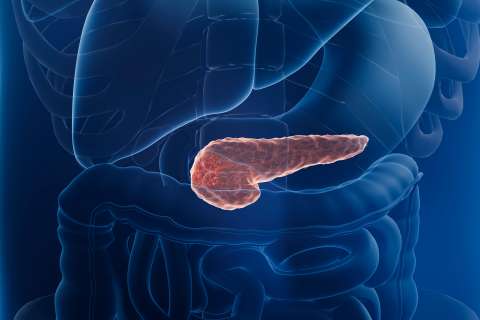Physicians and scientists agree: If we cannot prevent cancer, the next best thing is to find it earlier to maximize the chances of a successful fight.
Now there may be a new weapon in the battle against the so-called deadliest cancer—cancer of the pancreas. A multidisciplinary group of investigators from UCLA’s Jonsson Comprehensive Cancer Center, the UCLA School of Dentistry, the David Geffen School of Medicine at UCLA and the UCLA School of Public Health has demonstrated the usefulness of salivary diagnostics in the effort to find and fight the disease when it’s in the earliest stages.
Their results were published Feb. 16, 2010, in the journal Gastroenterology.
Pancreatic ductal adenocarcinoma, the most common pancreatic cancer, is also the most lethal of all cancers, with a mortality rate of nearly 90 percent. The American Cancer Society reports that more than 42,000 Americans were diagnosed with pancreatic cancer in 2009, and more than 35,000 of those died. Pancreatic cancer is the fourth leading cause of cancer death in the United States.
A “silent killer,” pancreatic cancer produces its typical symptoms—abdominal pain and jaundice—only in the disease’s advanced stages, making it difficult to treat. Fewer than 5 percent of those diagnosed with pancreatic cancer live five years, and full remission is very rare.
“Worldwide, the prevalence of pancreatic cancer is so high and the disease is so deadly that it calls out for a reliable means of early diagnosis,” said Dr. David Wong, a Jonsson Cancer Center researcher, associate dean of research at the dental school and senior author of the study. “The ability to implement safe, cost-effective, widespread screening could be the answer to saving thousands of lives each year—and that is what we are after.”
In the past few years, technological advances have pushed the concept of salivary diagnostics for systemic disease to the forefront of scientific attention.
Wong and his team already have demonstrated the usefulness of saliva in detecting oral cancer, said Dr. James Farrell, an associate professor in the UCLA Division of Digestive Diseases and director of the Pancreatic Diseases Program at UCLA.
“As a clinician-scientist who manages patients with all stages of pancreatic cancer, I was eager to work with them to explore the possibilities it could yield in diagnosing this disease,” Farrell said. “Not only are these saliva-based diagnostic methods for pancreatic cancer simple and noninvasive, they may also represent an improvement over currently used procedures, such as blood tests, for early pancreatic cancer detection.”
In the study, the researchers successfully linked changes in the molecular signatures found in human saliva to the presence of early-stage pancreatic cancer.
By analyzing altered gene expression, the researchers identified four messenger RNA biomarkers—KRAS, MBD3L2, ACRV1 and DPM1—that differentiate pancreatic cancer patients from those without cancer with 90 percent sensitivity and 95 percent specificity.
Due to the study's modest sample size of 90 human subjects, the researchers acknowledge limitations yet express enthusiasm for further research. They are formulating plans to test the salivary biomarkers in a larger population in a multicenter study. And they note that the potential for salivary biomarkers to identify very early-stage and even pre-invasive pancreatic cancer requires further investigation.
The National Institute of Dental and Craniofacial Research and the National Cancer Institute provided funding for this research.
In addition to Wong, the research team included No-Hee Park of the UCLA School of Dentistry and David Chia of the David Geffen School of Medicine at UCLA. Chia and Park also are members of UCLA’s Jonsson Comprehensive Cancer Center.
Researchers Find Biomarkers in Saliva for Early Detection of Pancreatic Cancer

Representation of a pancreatic cancer cell dividing.
Related Content
Articles:
Services:
Cancer Center Members
Share:




